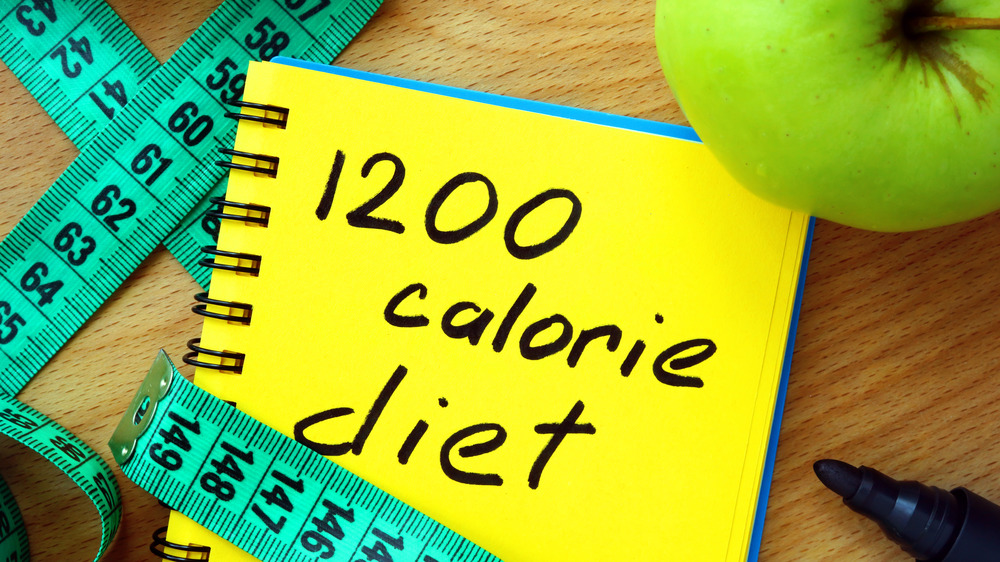What My 600-Lb Life Gets Wrong About Diets
When you watch TLC's My 600-lb Life, it may be tempting to try to follow the diet plan. Patients on the reality TV show typically weigh hundreds of pounds over their desired weight. For many, losing excess pounds is a matter of life or death. The show features Dr. Nowzaradan (aka Dr. Now), a bariatric surgeon in Houston, TX. The doctor recommends a 1,200 calories or less per day diet plan that his patients follow, Woman's Day reported. The low-calorie plan is also low fat and low carb, which can be an incredibly challenging change (via U.S. News & World Report). Patients go on the pre-surgery plan to show that they're ready to make lifestyle changes to lose weight (via Eat Move Hack).
The diet includes a long list of things to avoid, including nuts and nut butters, pastries and sweets, popcorn, chips, pasta, rice, potatoes, and many other foods. Additionally, weight loss shakes, sugary drinks and juices, and sweeteners like sugar, honey, and others are off-limits on the diet. Dr. Now wants his patients to focus on whole, unprocessed foods like whole grains, low-sugar fruits, vegetables, and lean meats. While adhering to such low calories and cutting out so many foods can lead to dramatic weight loss, it can also be incredibly challenging to do all at once. The plan also results in rapidly losing weight, which may not be the best way to drop extra pounds, depending on your situation.
The surprising truth about low carb, low fat diets like Dr. Now's
If you've followed a low-fat, low-carb diet, you know it's challenging to stick to. While it leads to rapid weight loss, it's not something most people can adhere to long-term. Shreela Sharma, a registered dietitian and an associate professor at UTHealth School of Public Health at Houston, explained the diet's pitfalls to U.S. News & World Report. "While low-fat, low-carb, high protein diets may work for weight loss in the short term, they are essentially 'deprivation diets' and could have short- and long-term negative healthy impacts," Sharma explained. Ultimately, Sharma noted that restrictive diets set people up for failure, and she suggested a focus on eating more whole grains and plant-based foods along with lean protein and healthy fats.
Dr. Now's low-calorie diet also produces rapid weight loss, a necessity for his patients whose needs are vastly different than the average person looking to drop some extra weight. The rapid low-calorie weight loss plan isn't the healthiest way to drop pounds for everyone, however (via Mayo Clinic). Healthy, lasting weight loss is usually one to two pounds per week, a 500 to 1,000 calorie daily deficit. The only way to drop pounds and keep them off is by making healthy, sustainable lifestyle changes. The restrictive 1,200 calories per day diet that Dr. Now recommends isn't one that most people can stick to long-term.
Here's what you need to know about health problems with 1,200 calorie diets
Eating extremely low calories over time and rapidly losing weight can cause various health problems, including extreme hunger, dizziness, gallstones, headaches, and fatigue (via Web MD). They're best reserved for obese people who have a BMI over 30, and if that's you, you should only undergo a restrictive diet under medical supervision. While losing weight helps with health issues like diabetes, high blood pressure, and high cholesterol, they aren't as sustainable as modest dietary changes, which may be more beneficial in the long-run. Also, drastically reduced food intake may also leave you too exhausted to exercise, which means you might not enjoy the benefits of at least 30 minutes of brisk activity several days a week (via Healthline).
While Dr. Now's plan clearly works for some of his patients before they undergo bariatric surgery on My 600-lb Life, it probably isn't a viable choice for the majority of people. Talk to a professional to determine a diet that's healthy for you.


